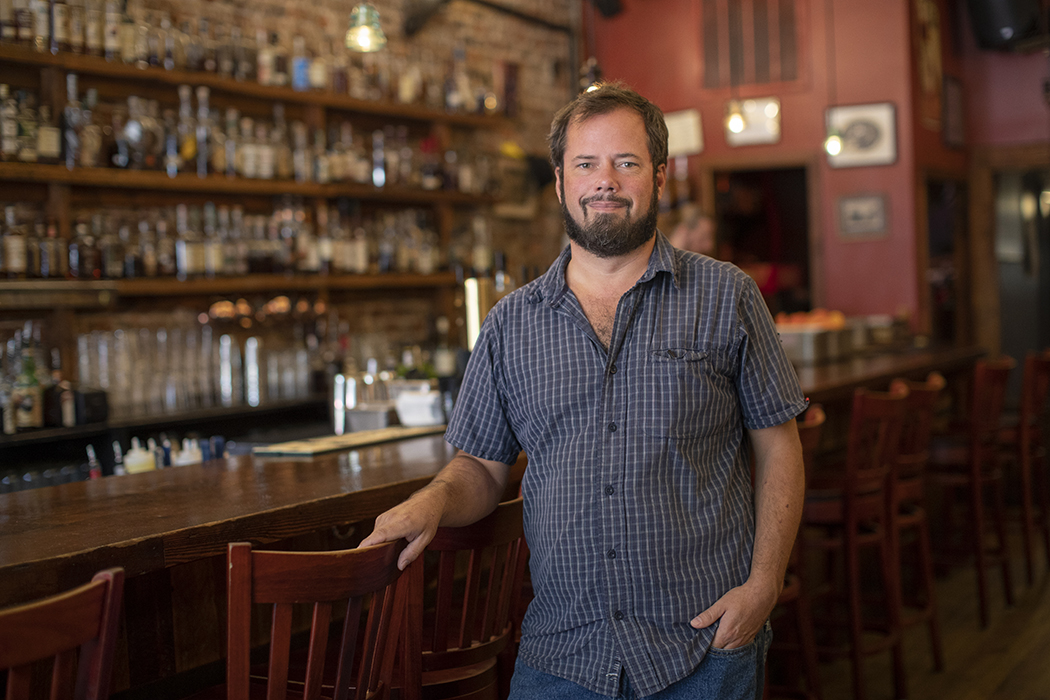For nearly a year, a “now hiring” sign hung at the entrance to Baggby’s on the Downtown Mall. With the arrival of the coronavirus vaccine, owners Jon and Erin LaPanta hoped that applicants would start rolling in—but none came.
“Now that business is coming back, we’ve had to turn business away,” says Jon LaPanta, who has operated the sandwich shop with his wife entirely on their own throughout the pandemic. “We’ve had 15- to 20-minute waits…and I’ve had to turn down catering, because I just don’t have the staff.”
Across the country, many businesses, particularly in the service industry, are also struggling to find workers. Though around 10 million Americans are currently unemployed, massive numbers of jobs at restaurants and retail stores remain unfilled, sparking debate over the impact of expanded unemployment benefits.
Thanks to the American Rescue Plan, qualifying workers can receive $300 per week on top of state unemployment insurance through September 6, adding up to $600 per week—or nearly $16 an hour. In Virginia, the minimum wage for restaurant workers is $2.13 an hour before tips.
At his array of local eateries, restaurateur Will Richey says it’s been “astonishingly hard” to bring in new employees as the economy has opened back up.
“Just nobody was looking for work [and] replying to the ads at all,” says Richey, who manages The Bebedero, Brasserie Saison, Revolutionary Soup, and other Charlottesville restaurants. “I’ve heard rumors that it’s just people sitting and still collecting unemployment, but I don’t know what it is. It almost seems like there aren’t people to take the jobs.”
Some business owners blame this staffing crisis on the extra unemployment benefits.
“We have employees who refuse to go back to work because they are getting more money collecting unemployment, but I don’t think they realize some of those jobs are going to disappear,” says Rebecca Haydock, director of the Central Virginia Small Business Development Center. “We have seen businesses that have had to close their doors because employees won’t come back to work.”
But according to University of Virginia economist Leora Friedberg, “there are many factors” contributing to the current situation. Friedberg points to the range of health risks service workers must consider before taking on a job. “Some of it is related to government payments, but that part of it is largely going to be temporary,” she says.
Friedberg also says childcare is a big factor keeping people from returning to work. Though schools in Charlottesville and Albemarle County currently offer in-person learning, students still learn from home at least once a week. And next month, schools will be closing again for summer break.
To bring back employees, businesses must guarantee safe working conditions and offer incentives that make it worth working there, including a living wage, flexible schedule, and competitive benefits, explains Friedberg.
“Wages are going to go up, and that means prices will have to go up also. The restaurants and stores…can’t just take the money out of pocket,” she says. “Ultimately consumers, who to some extent do have extra cash right now, are going to end up paying for all of that.”
In a Monday press conference, President Biden pushed back on the narrative that unemployment benefits were keeping people from working. “My expectation is that as the economy comes back, these companies will provide fair wages and safe work environments, and if they do, they’ll find plenty of workers,” said Biden. “We’re not going to turn our backs on our fellow Americans.”
Some area businesses have tried attracting employees with increased wages. Bodo’s co-owner Scott Smith says the restaurant had trouble finding workers this year. The bagel chain raised its starting salary to $13 an hour, and by keeping its dining room closed, Bodo’s has aimed to keep staff safe from infectious customers, says Smith. (Since the pandemic started, two Bodo’s employees have tested positive for COVID, but Smith says they did not catch the virus while at work.)
“The applicant pool is getting a little bit better now…especially as vaccines are kind of penetrating,” he says. “But boy in January and February, it was just really hard to find people.”
To attract applicants for his latest venture, the steakhouse South and Central, Richey realized he would have to sweeten the deal. Last month, he offered a signing bonus—those who kept the job for three months would receive an extra $500. But that only brought in a few more applications.
Through social media, Richey was able to find a demographic willing to take the job: high schoolers. This week, South and Central will open at Dairy Market with a “very large team of teenagers,” he says.
Across his restaurants, Richey says he has also upped the pay to encourage people to apply and stay on the team. A lot more positions are making at least $15 per hour, plus tips.
“We’re not [at $15] across the board, and still rely very heavily on the tip situation,” Richey says. “A 16-year-old coming on to take a job with us, we may start them at $10 or $12 an hour…but they’re getting closer to $14 or $15 an hour with tips.”
“The best thing that businesses can do is to create support and safety for people,” says Smith.
